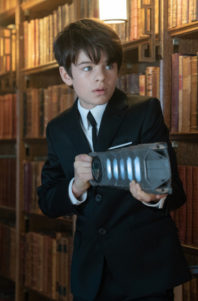
The promise of personalization and autonomy is undone since Netflix simply shifts such demographic markers to genre tags. Identity is displaced from the user to the content. In other words, the user does not bring their identity—along with the complexities that inform it—to the platform, rather the platform has determined what these mean. The PRS can then steer the user toward this content, thus ghettoizing the user in a prescribed category of demographically classified content.
-Sarah Arnold, “Netflix and the Myth of Choice/Participation/Autonomy”
Spoilers Henceforth for Artemis Fowl.
There’s a running joke that I like to make, and it is that I too liked Fall Out Boy and then was no longer thirteen. This is a joke that I get to make with great infrequency, because one rarely hears Fall Out Boy in any form of public space, nor does the band have any sway upon the cultural whatsoever. I suspect, however, that many agree with me as a I receive a gambit of reactions ranging from mildly amused to hysterical laughter to knowing grimaces. It turns out that many probably enjoyed the music of Fall Out Boy and then were no longer thirteen.
It would be a mistake to suggest that we do not grow out of things. I make the joke specifically about Fall Out Boy, however, there are a wide variety of age ranges and content that could malleably fit this. There are films that my teenaged-self loved that I cringe at now in retrospect. There are others that still make me giddy just thinking about them. It’s in the why that that response has changed that is important to me. Sometimes, you’re simply no longer thirteen.
I’ve thought about this a lot in the last couple of weeks as J.K. Rowling’s attempts at maintaining some semblance of cultural relevancy have revealed themselves in the form of virulent transphobia, and in turn have forced a number of questions regarding continued adult appreciation of a series which released the last of its main books when I was ostensibly well, thirteen. The height of Harry Potters global cultural influence was probably over a decade ago, and yet, it has settled into a spot where it’s one of the largest media franchises on the face of the planet. So much so, that grown adults will do things like boldly proclaim they are “a Hufflepuff” in social media bios, and spend large sums of money to drink “butterbeer” at a theme park in Florida.
A complete aside; my two cents on how to approach the Rowling controversy is as follows. Everything J.K. Rowling has said regarding trans folk is despicable, hateful, harmful, and whatever other negative qualifier you want to attach to her statements. Moreover, these comments demonstrate a pattern of thinking that suggests little inclination to learn or change. If you feel guilty about your enjoyment of a series written and created by a notorious transphobe, that is probably a good thing, as it suggests an awareness beyond yourself. You personally can probably come up with the ideal solution for yourself. Maybe, however, you don’t need to funnel more money towards your fandom. If you absolutely must continue to do so, maybe consider making an equal donation to one of the many excellent trans related charities when it comes time to buy your ticket for Fantastic Beasts 11.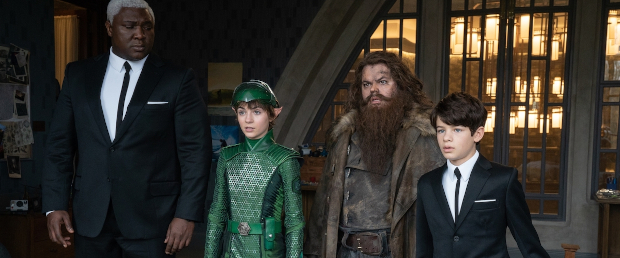
While I may have been a fan of Harry Potter until I hit thirteen, the same cannot be said for large swaths of the population. Partially, I believe that this may be a result of the fact that there was so much Potter at the turn of the century. The Philosopher’s Stone was written in 1997. Just four years later Warner Bros had a successful film adaptation destroying the Christmas box office. The direct success of the novels, and their subsequent adaptations, changed the face of YA media forever. There is no Twilight mega-franchise without the exploits of Harry Potter, nor does the career of Jennifer Lawrence reach mega-stardom with the alacrity that it did. The elephantine early success of the Harry Potter franchise not only extended its cultural shelf-life to an indefinite length, it also changed the entire model for the popular YA franchise. If your novel reaches a base level of popularity, you can get a filmic adaptation, which in turn begets more films, novels, and merchandise, until eventually you are the sun like Potter is.
This model has dried up recently, but you can see it in both the successes and failures of YA franchises over the last two decades. Both the aforementioned Twilight and Hunger Games series followed this path with aplomb, to the extent that both will have new novels released in 2020. Many others fell flat on their faces, evidenced by the numerous lists of failed YA franchises that arise from a simple google search. For every How to Train Your Dragon there’s are multiple Eragons (oh my god, do you remember Eragon???). I read many of these books as a youth. Many of them received novelizations, and many of those subsequently failed.
One of the popular YA franchises from my childhood that I did not read, was the Artemis Fowl series. I made it roughly a third of the way through before determining its high fantasy impulses to be “very silly” (it amazes me how much of a contrarian jerk I was even as a child). When Potter struck gold, I assume that nearly every possible YA franchise with a modicum of a following was optioned off. This is probably why we got an Alex Rider film with Mickey Rourke. The perpetual optioning of various properties includes Eoin Colfier’s novels, which were purchased by Mixmax in 2001. The direct timeframe connected to the first Harry Potter film here, feels apt. Fowl’s world of high fantasy made-up words could easily be seen as a parallel to a magical world similarly filled with made-up worlds.
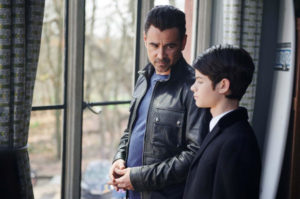 This, never happened. Adapting Colfier’s novels proved exceedingly difficult, something I find a little peculiar in light of the fact that similar high fantasy series such as C.S. Lewis’ Narnia novels. The Disney corporation is the key difference here. Disney owns commercial rights to Lewis’ texts, and for some godforsaken reason are still planning on making another one. In contrast, Fowl didn’t come under the ever-expanding tentacles of the Walt Disney Entertainment until 2013. Numerous versions of the film existed prior to the Disney acquisition. At one point, Saoirse Ronan was in talks to play Artemis’ elven friend Holly Short. Eventually, Disney’s growth into the late 2010s coincided with the acquisition of the property, and ultimately, by 2017 numerous pieces of the final product would be in place.
This, never happened. Adapting Colfier’s novels proved exceedingly difficult, something I find a little peculiar in light of the fact that similar high fantasy series such as C.S. Lewis’ Narnia novels. The Disney corporation is the key difference here. Disney owns commercial rights to Lewis’ texts, and for some godforsaken reason are still planning on making another one. In contrast, Fowl didn’t come under the ever-expanding tentacles of the Walt Disney Entertainment until 2013. Numerous versions of the film existed prior to the Disney acquisition. At one point, Saoirse Ronan was in talks to play Artemis’ elven friend Holly Short. Eventually, Disney’s growth into the late 2010s coincided with the acquisition of the property, and ultimately, by 2017 numerous pieces of the final product would be in place.
I never read Colfier’s novels as a child, but I did read a bit of the first one in order to write this piece. Needless to say, it was not a successful experience. From what I could gather, the novels follow the exploits of a twelve-year-old who is the head of a crime family? Also, there’s high fantasy concepts like elves, trolls, dwarves and fairies? Colfier has stated in the past that he feels the novels are akin to “Die Hard with fairies,” and like, I guess?
It’s impossible to tell what Die Hard with fairies actually looks like, because supposedly Artemis Fowl the film makes numerous deviations from its original source material. Supposedly, novel Artemis is a bit of an anti-hero, a genius twelve-year-old with a somewhat myopic understanding of the world, who learns its complexities, and subsequently how to be a better person, as a result of working with fairies. Film Artemis (Ferida Shaw) retains the genius element, but removes the anti-hero one. Young Fowl the film character has very few characteristics, but two are notable. One, he’s still a precocious genius, and two he really loves his father (Colin Farrell), who is also named Artemis Fowl and is actually the criminal mastermind of the family. Fowl is captured from his yacht by a mysterious hooded figure, who gives him three days to recover a artifact (McGuffin) named the Aculos.
Artemis Fowl slims two action packed novels into one breakneck novel, a choice that makes some sense if you think about it in terms adapting an eight-novel franchise into a filmic one, but makes little sense when you consider how dense this plot winds up becoming as a result. I really have little capability to describe what really happens in this film. There’s an elven war room led by Judi Dench, Josh Gad plays a massive dwarf, young Artemis wears sunglasses because the film that Branagh really wants to emulate here is Gordy.
I completely forgot! Kenneth Branagh is the director of Artemis Fowl, which is bizarre to say the least. None of the direction here particularly stands out, which suggests that Branagh’s influence is either minimal, or he was determined as possible to make an extremely boring film. The film feels like an A.I. was forced to watch and read a 1000+ hours worth of action-science fiction films, and then spit out its best approximation of what a children’s fantasy YA film would look like. There’s an abundance of a fake looking jade green in this film, seemingly for no other reason than it’s a colour traditionally associated with science-fiction. None of the CGI is particularly convincing. There’s a madcap scene with a troll and seems disjunctively edited to all hell.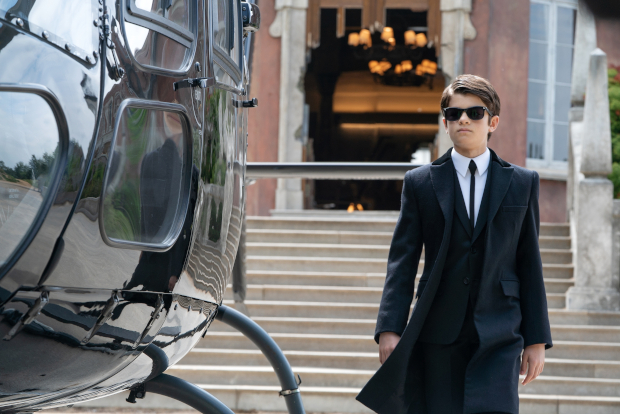
This is pretty much all I have to say about Artemis Fowl the film in a vacuum. As a film, there’s very little to talk about aside from the fact that it feels like this was culled straight from the depths of market testing hell. More interesting is the fact that this film cost an estimated 125 million dollars and has now officially died a quick and painless death on Disney+. Before the pandemic hit this film was scheduled for a theatrical release roughly around the same time that it was unceremoniously dumped onto Disney+, which suggests that the film was either completed or in need of minimal work by March of 2020.
Which raises the question: they actually thought people were going to pay to see this? Honestly, who knows. I feel confident in the assertions that entirely in this vacuumed instance, Disney is probably lucky that they never had to release this film. Instead of substantially flopping at the box office, Artemis Fowl can now sit untouched in the Disney+ library, an accidental relic.
I can’t help but wonder, however, if this was the plan all along. That the corporate overlords who rule our media landscape were under the impression that it doesn’t really matter what the theatrical looks like, we need this to fill out our streaming library. When Disney+ launched in November, I wrote about what I felt a streaming service needed to be. The very first point I wanted to emphasize was that a streaming platform needed to place the quality of its content at the forefront of its plan. Maybe that’s an idyllic response. We’ve reached a stage in the media landscape where streaming services can be a self-fulfilling prophecy, where target demographics dictate how content is produced and for whom. Artemis Fowl’sgreatest failure isn’t that it feels inert, it’s that it feels like Fantasy Placeholder: Ages 8-12. Even spookier, this seems to be far from an outlier. Anyone see that Eurovision film from last week? That feel like Placeholder: Adult Comedy to anyone else?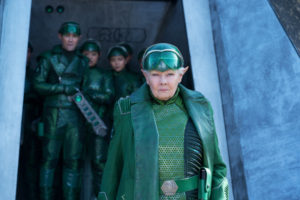
To close the circle that I’ve set up from the beginning, I wonder if part of what has created this is our ubiquitous need to make the specific art we appreciate a defining characteristic of our personalities. I made fun of Harry Potter fans to begin this piece, but I am correct in this one sense: there are a lot of people who have Harry Potter fan as a defining personality trait of their being. Those novels, however, are pretty much the brainchild of one (unfortunately one) person. Can you really say the same about Stranger Things? Ozark? The inevitable Three Men and a Baby remake? You’re not choosing the algorithm, it’s choosing you. That is scarier than Josh Gad’s Cronenbergian pelican mouth.

